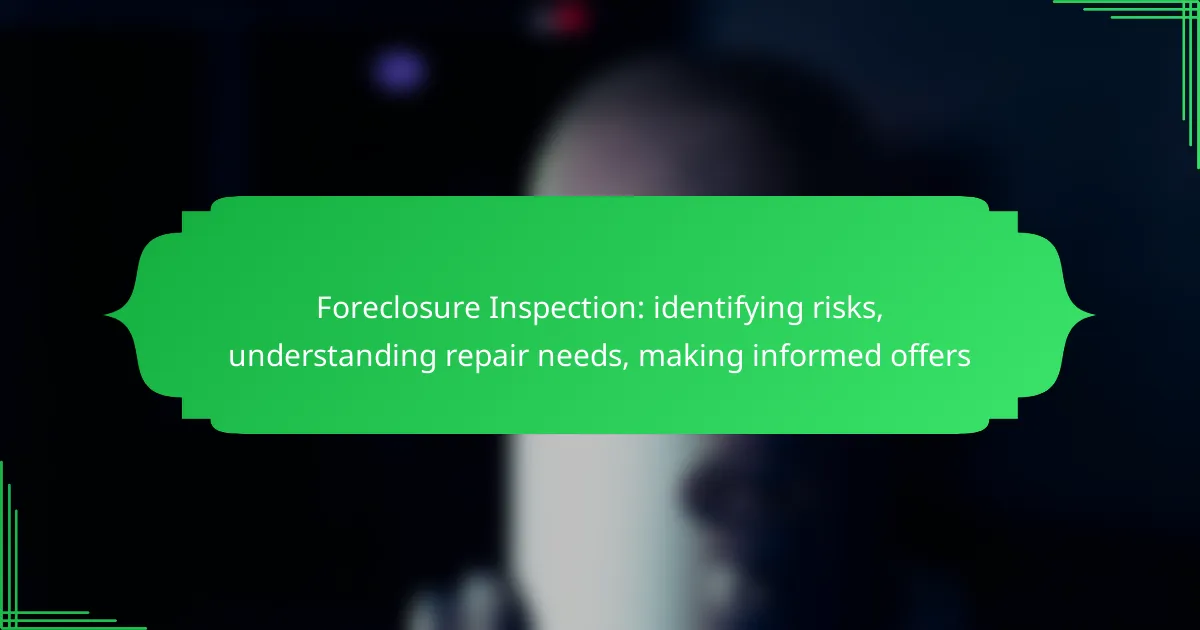Foreclosure properties present unique challenges and risks that buyers must navigate, including potential structural issues and legal complications. A thorough inspection is essential to identify necessary repairs and assess the property’s overall condition, enabling buyers to make informed offers. By prioritizing critical repairs related to safety and essential systems, prospective buyers can avoid costly pitfalls and ensure a sound investment.

What are the risks of foreclosure properties in Los Angeles?
Foreclosure properties in Los Angeles carry significant risks that potential buyers must consider, including structural issues, legal complications, pest problems, environmental hazards, and neighborhood decline. Understanding these risks can help buyers make informed decisions and avoid costly mistakes.
Structural damage
Structural damage is a common concern with foreclosure properties, often resulting from neglect or lack of maintenance. Buyers should look for visible signs such as cracks in the foundation, sagging roofs, or uneven floors, which may indicate serious issues.
It’s advisable to hire a professional inspector to assess the property thoroughly. Repair costs can vary widely, from a few thousand dollars for minor fixes to tens of thousands for major structural repairs.
Legal issues
Legal issues can arise with foreclosure properties, including unresolved liens, title disputes, or pending litigation. Buyers should conduct a title search to uncover any existing claims against the property that could complicate ownership.
Consulting with a real estate attorney can provide clarity on potential legal risks and help navigate any complexities in the buying process.
Pest infestations
Pest infestations are another risk associated with foreclosure properties, particularly if the home has been vacant for an extended period. Common pests include termites, rodents, and other vermin that can cause significant damage.
A thorough pest inspection is essential before purchasing. Treatment costs can range from a few hundred to several thousand dollars, depending on the severity of the infestation.
Environmental hazards
Environmental hazards, such as mold, lead paint, or asbestos, may be present in older foreclosure properties. These issues can pose health risks and require costly remediation.
Buyers should consider environmental assessments, especially for homes built before the 1980s. Remediation can be expensive, so understanding these risks upfront is crucial for budgeting.
Neighborhood decline
Neighborhood decline can significantly impact the value of a foreclosure property. Factors such as rising crime rates, vacant homes, and declining property values can deter potential buyers and affect resale potential.
Researching the neighborhood’s trends and speaking with local residents can provide insights into the area’s future prospects. Investing in a declining neighborhood may lead to greater risks and challenges in the long run.
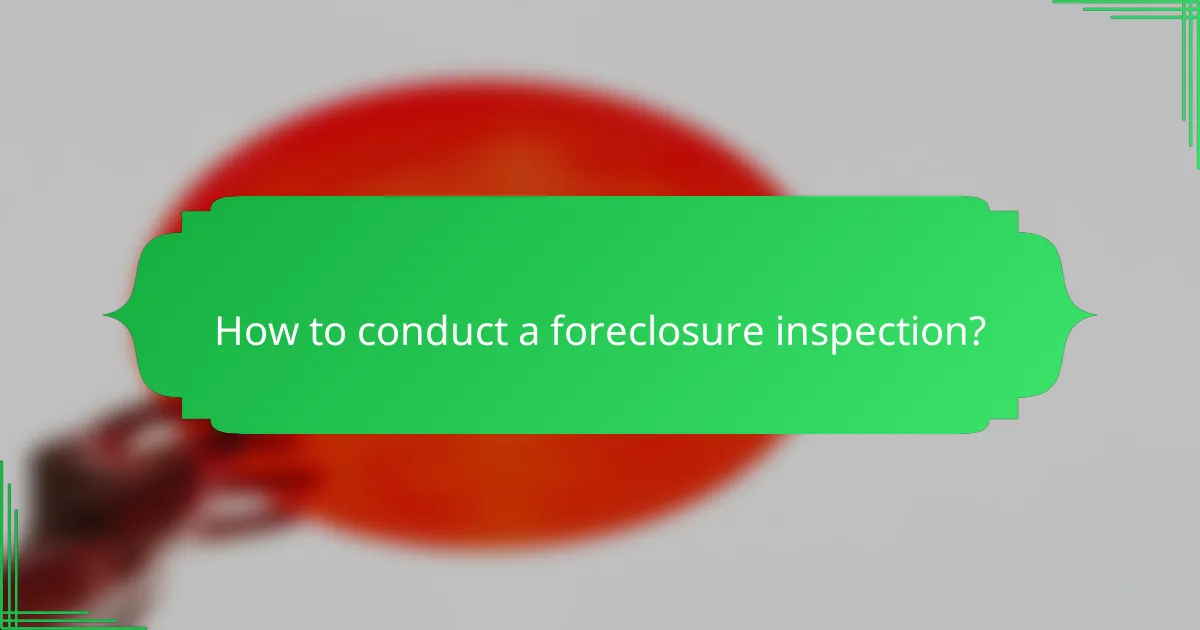
How to conduct a foreclosure inspection?
Conducting a foreclosure inspection involves a thorough examination of the property to identify potential risks and necessary repairs. This process helps buyers make informed offers based on the property’s condition and any underlying issues.
Visual assessment
The visual assessment is the first step in a foreclosure inspection, focusing on the property’s exterior and interior. Look for signs of neglect, such as overgrown landscaping, peeling paint, or broken windows. Inside, check for water damage, mold, and structural issues.
Take notes and photographs of any visible problems to reference later. This initial evaluation can reveal significant issues that may affect the property’s value and your potential repair costs.
Document review
Reviewing documents related to the property is crucial for understanding its history and any existing liens or legal issues. Obtain the title report, property tax records, and any previous inspection reports to identify past problems and repairs.
Pay attention to any disclosures from the seller regarding known issues. This information can help you gauge the extent of repairs needed and negotiate a fair offer based on the property’s condition.
Professional evaluation
A professional evaluation by a licensed inspector or contractor can provide a comprehensive assessment of the property’s condition. They can identify hidden issues that may not be visible during a visual assessment, such as electrical or plumbing problems.
Consider hiring professionals who specialize in foreclosures, as they are familiar with common pitfalls. Their insights can help you estimate repair costs more accurately and inform your offer strategy. Aim for a detailed report that outlines necessary repairs and potential costs to aid in your decision-making process.
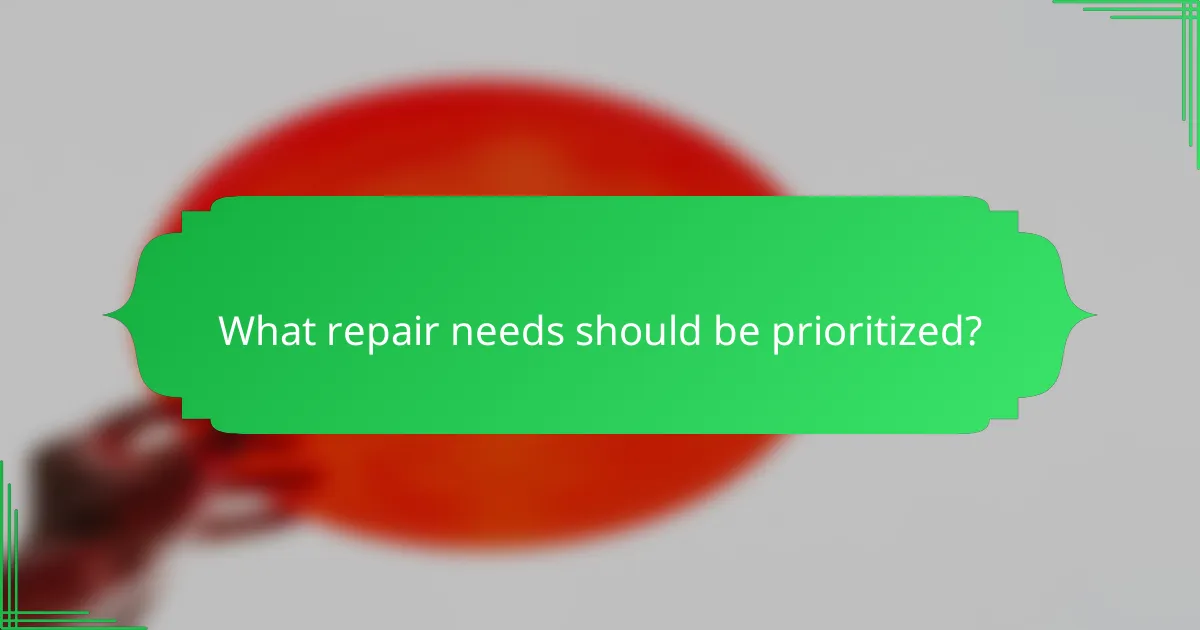
What repair needs should be prioritized?
When assessing a foreclosure property, prioritize repairs that impact safety, structural integrity, and essential systems. Focus on roof and foundation issues, electrical and plumbing updates, and HVAC system checks to ensure the property is livable and compliant with local standards.
Roof and foundation repairs
Roof and foundation repairs are critical as they protect the entire structure. Inspect for missing shingles, leaks, or cracks in the foundation, which can lead to significant damage if not addressed promptly. A roof replacement can range from a few thousand to tens of thousands of dollars, depending on the size and materials used.
Look for signs of water damage inside the home, such as stains on ceilings or walls. These may indicate roof leaks or foundation issues that need immediate attention. Hiring a professional inspector can provide a clearer picture of the necessary repairs and costs involved.
Electrical and plumbing updates
Updating electrical and plumbing systems is essential for safety and functionality. Check for outdated wiring, which may not meet current codes, and inspect plumbing for leaks or corrosion. Rewiring a home can cost several thousand dollars, while plumbing repairs can vary widely depending on the extent of the issues.
Ensure that all outlets and fixtures are functioning properly and that there are no visible signs of water damage around plumbing installations. Consider hiring licensed professionals to evaluate and perform necessary updates to comply with local regulations.
HVAC system checks
HVAC system checks are vital for maintaining a comfortable living environment. Inspect the heating and cooling systems for efficiency and functionality. A well-maintained HVAC system can save on energy costs, while a failing system may require costly repairs or replacements.
Look for signs of wear, such as unusual noises or inconsistent temperatures throughout the home. If the system is outdated, consider budgeting for a replacement, which can range from a few thousand to over ten thousand dollars, depending on the system’s size and efficiency ratings. Regular maintenance can extend the life of HVAC systems and improve indoor air quality.
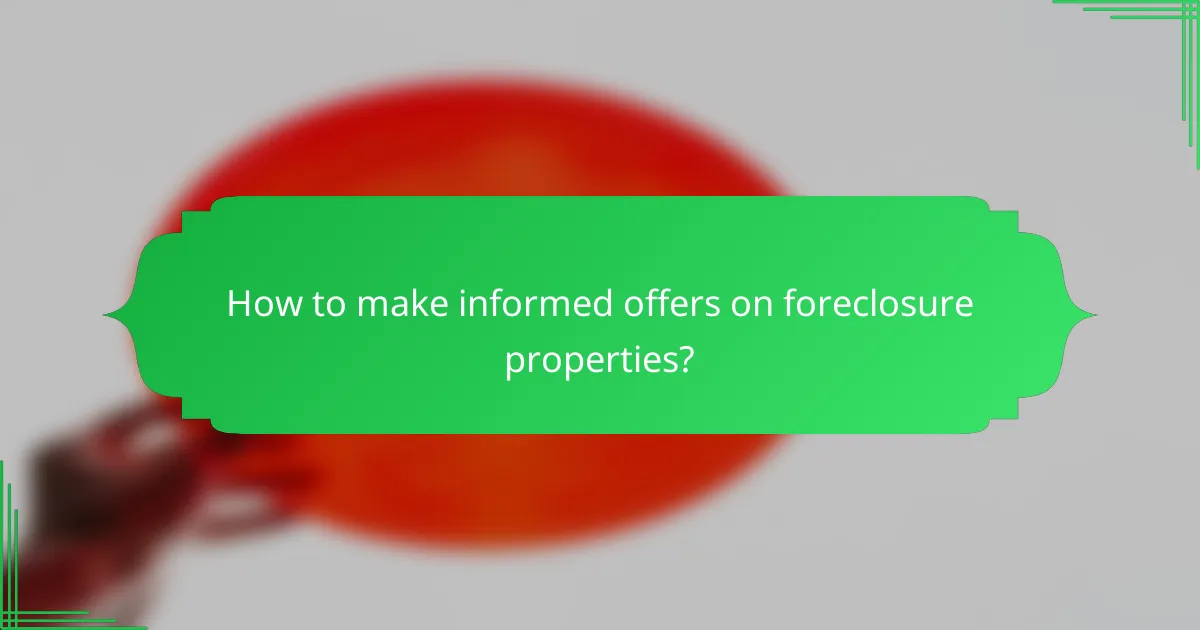
How to make informed offers on foreclosure properties?
To make informed offers on foreclosure properties, conduct thorough research on the market, assess repair needs, and evaluate comparable sales. This approach helps you determine a fair price and avoid overpaying for a property that may require significant investment.
Market analysis
Market analysis involves examining the local real estate market to understand property values and trends. Look at recent sales data, current listings, and neighborhood conditions to gauge demand and pricing. This information is crucial for setting a competitive offer on a foreclosure property.
Consider factors such as the average days on market and the price per square foot in the area. A well-researched market analysis can reveal whether a property is priced appropriately or if you can negotiate a better deal.
Repair cost estimation
Estimating repair costs is essential when evaluating a foreclosure property. Inspect the property thoroughly, noting any structural issues, plumbing or electrical repairs, and cosmetic updates needed. Use local contractor quotes or online calculators to get a rough idea of potential expenses.
As a rule of thumb, budget for repairs that could range from a few thousand dollars for minor updates to tens of thousands for major renovations. Always factor these costs into your offer to ensure you’re not caught off guard later.
Comparable sales evaluation
Evaluating comparable sales, or “comps,” helps you understand what similar properties in the area have sold for recently. Look for homes with similar square footage, age, and condition that have sold within the last six months. This data provides a benchmark for your offer.
When analyzing comps, adjust for differences such as location, upgrades, or unique features. This will give you a clearer picture of the property’s value and assist you in making a well-informed offer that reflects the market conditions.
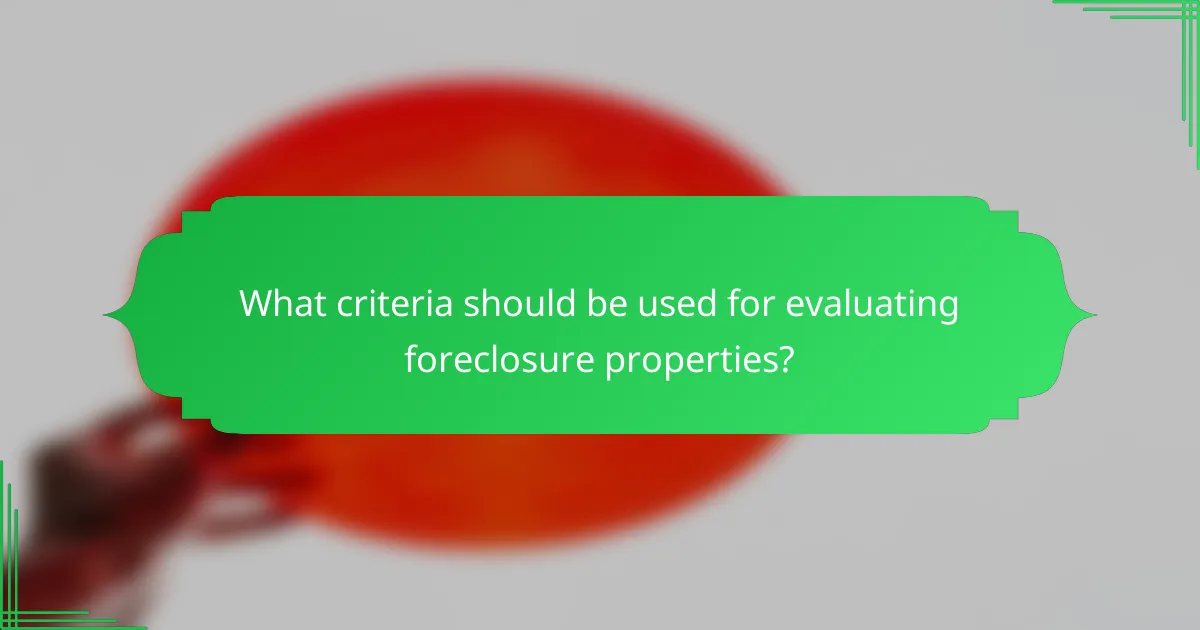
What criteria should be used for evaluating foreclosure properties?
Evaluating foreclosure properties requires a careful assessment of several key criteria, including location, property condition, and current market trends. These factors help determine the potential value and risks associated with the property, enabling informed purchasing decisions.
Location analysis
Location is a critical factor in evaluating foreclosure properties, as it significantly influences resale value and rental potential. Consider proximity to schools, public transportation, and amenities, as well as the overall safety and desirability of the neighborhood.
Research local zoning laws and development plans, as these can impact future property values. For instance, areas undergoing revitalization may offer better investment opportunities compared to those in decline.
Property condition assessment
Assessing the condition of a foreclosure property involves a thorough inspection of its structural integrity, systems, and overall maintenance. Look for signs of water damage, mold, or pest infestations, as these can lead to costly repairs.
It’s advisable to hire a professional inspector to identify hidden issues. Budget for potential repairs, which can range from minor cosmetic fixes to major renovations, depending on the property’s state.
Market trends
Understanding current market trends is essential for evaluating foreclosure properties. Analyze recent sales in the area to gauge property values and demand. Look for trends in pricing, inventory levels, and the average time properties spend on the market.
Stay informed about economic factors that could affect the housing market, such as interest rates and employment rates. This knowledge will help you make competitive offers and avoid overpaying for a property.
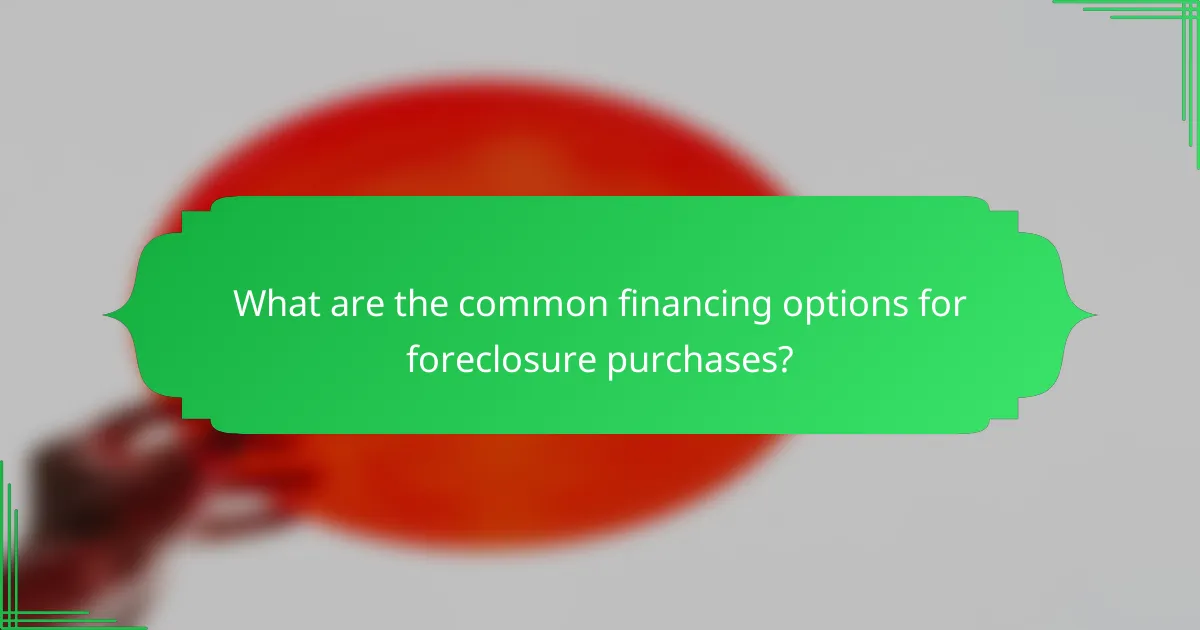
What are the common financing options for foreclosure purchases?
Common financing options for foreclosure purchases include traditional mortgages, cash purchases, and government-backed loans. Each option has its own requirements and implications for buyers, making it essential to understand the best fit for your financial situation.
Traditional Mortgages
Traditional mortgages are loans from banks or credit unions that typically require a down payment and good credit. For foreclosure purchases, lenders may require a larger down payment due to the perceived risks associated with these properties.
Interest rates on traditional mortgages can vary, so it’s advisable to shop around for the best terms. Be prepared for additional costs such as property inspections and appraisal fees, which can add to your overall expenses.
Cash Purchases
Buying a foreclosure with cash can simplify the process and may give you a competitive edge in negotiations. Cash offers are often more attractive to sellers because they eliminate the risk of financing falling through.
However, ensure you have sufficient funds not only for the purchase but also for any necessary repairs or renovations. This option is ideal for investors or buyers with liquid assets ready to deploy.
Government-Backed Loans
Government-backed loans, such as FHA or VA loans, can be excellent options for financing foreclosure purchases, especially for first-time homebuyers. These loans often require lower down payments and have more flexible credit requirements.
Keep in mind that these loans may have specific property condition requirements, which can affect your choice of foreclosure properties. Always check eligibility criteria and ensure the property meets the necessary standards before proceeding.
